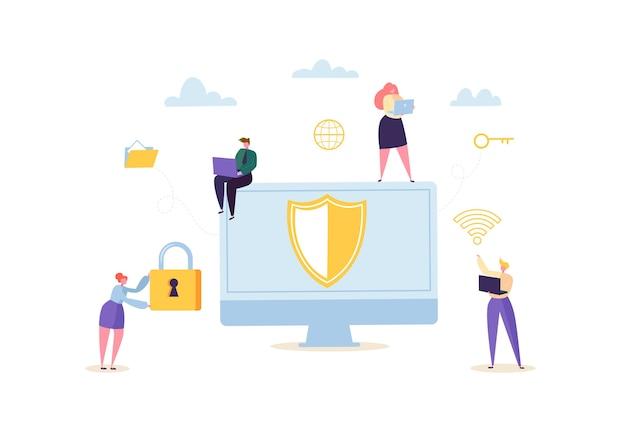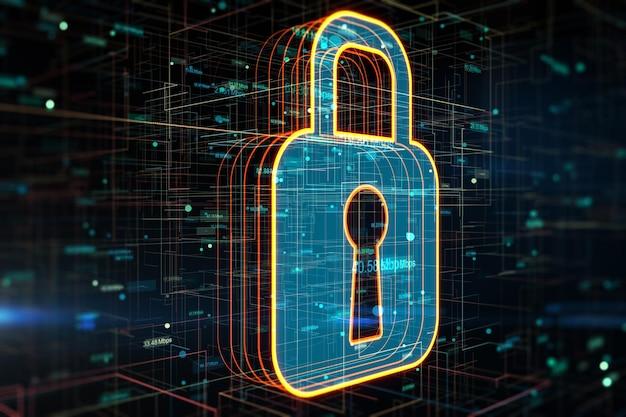In today’s digital age, where information travels at lightning speed and the internet plays a central role in our lives, ensuring confidentiality and data protection has become more critical than ever before. With the rise in cyber threats and data breaches, organizations and individuals must understand the importance of safeguarding confidential information and personal data.
Confidentiality refers to the protection of sensitive information shared within a trusted relationship. It entails maintaining the privacy and trust of individuals by respecting their right to control the disclosure of their personal data. Whether it’s a client’s health records, financial details, or simply private conversations, confidentiality serves as the guardian of this information, ensuring it remains secure and undisclosed.
Data protection, on the other hand, encompasses the measures taken to safeguard personal and sensitive data from unauthorized access, use, or disclosure. It involves implementing secure data storage practices, using encryption and strong access controls, and adhering to relevant laws and regulations.
In this blog post, we will delve into the significance of confidentiality and data protection, explore their interconnection, and shed light on why they are of utmost importance in today’s workplace and society.

Why Confidentiality and Data Protection Are Vital
In today’s digital world, protecting our personal information is more important than ever. Confidentiality and data protection are not just buzzwords; they are crucial for safeguarding our privacy, security, and overall well-being. Let’s delve into why maintaining confidentiality and ensuring data protection should be a top priority for individuals and businesses alike.
Preserving Personal Privacy
Confidentiality serves as the guardian of our personal privacy online. Think about it like this: you wouldn’t want your deepest secrets plastered on billboards across town, right? Well, the same goes for your sensitive data in the digital realm. Whether it’s your bank account details, medical records, or even just your browsing habits, keeping this information confidential ensures that it stays in the right hands.
Defending Against Cybercrime
Are you ready for a chilling statistic? According to recent reports, cybercrime has increased by a staggering 300% in the last year alone. Scary, isn’t it? This is where data protection steps in as our trusty superhero, ready to thwart the evil plans of cybercriminals. Implementing robust data protection measures, such as encryption and access controls, serves as an impenetrable fortress against the ever-evolving tactics of hackers and cybercriminals.
Building Trust and Reputation
Confidentiality and data protection play a pivotal role in establishing trust and maintaining a stellar reputation, be it for individuals or businesses. Imagine entrusting your personal information to a company that has a track record of data breaches or mishandling sensitive data. Not so trustworthy, right? On the other hand, when organizations prioritize data protection, they cultivate an environment of trust, reassuring customers that their personal information is in safe hands. This, in turn, strengthens their reputation and helps them stand out in an increasingly competitive marketplace.
Complying with Legal and Ethical Standards
As society becomes increasingly aware of the significance of data privacy, governments and legislative bodies have tightened their grip on data protection regulations. Organizations that fail to comply with these laws risk facing hefty fines, legal ramifications, and damage to their reputation. By prioritizing confidentiality and data protection, businesses demonstrate their commitment to ethical practices and ensure compliance with regulatory requirements, such as the General Data Protection Regulation (GDPR) in the United States.
Avoiding Identity Theft and Fraud
Identity theft and fraud are like the grand illusionists of the digital world, capable of stealing our identities and wreaking havoc on our lives without us ever suspecting a thing. By safeguarding our confidential data, we put up a formidable shield against these malicious acts. Strong passwords, two-factor authentication, and limited sharing of personal information are essential in preventing fraudsters from making us their next unsuspecting victims. Remember, it’s better to be safe than sorry!
In conclusion, confidentiality and data protection are not just fancy terms to throw around; they are the superheroes of the digital realm, protecting our privacy, security, and peace of mind. By preserving personal privacy, defending against cybercrime, building trust and reputation, complying with legal and ethical standards, and avoiding identity theft and fraud, we can navigate the digital landscape confidently and securely. So, let’s make confidentiality and data protection our mighty guardians in this ever-evolving digital world. Stay safe, my friends, and keep those cyber villains at bay!

FAQ: Why is Confidentiality and Data Protection Important
Welcome to our FAQ-style subsection on the importance of confidentiality and data protection. Here, we’ll answer some of the most frequently asked questions about this crucial topic. So, grab a cup of coffee, sit back, and let’s dive in!
What is Confidentiality? Explain with an Example
Confidentiality is the practice of keeping information private and ensuring that only authorized individuals have access to it. Let’s imagine you visit a therapist to discuss personal matters. The therapist is legally bound to keep what you share confidential, meaning they won’t disclose it to others without your consent. This trust and respect for privacy build a safe space for open communication.
What is the Concept of Confidentiality
The concept of confidentiality revolves around respecting the privacy of sensitive information. It means that individuals or organizations entrusted with certain data must not disclose or misuse it. Whether it’s medical records, financial statements, or personal conversations, confidentiality ensures that the information remains secure and exclusive to authorized parties.
How Do You Explain Privacy and Confidentiality
Privacy and confidentiality are closely related but not identical concepts. Privacy refers to the right of individuals to control how their personal information is collected, used, and shared. On the other hand, confidentiality deals with the responsibility of those who receive and handle someone’s information, obliging them to keep it secret and secure. In summary, privacy is a broader concept dealing with personal control, while confidentiality focuses on the responsibility of handling information.
How Do You Explain Confidentiality to Clients
When explaining confidentiality to clients, you can reassure them that their personal information will be kept private and secure. It means that any details they share during conversations, transactions, or professional relationships will remain confidential, unless they provide explicit consent to disclose it. This understanding fosters trust and encourages open and honest communication between clients and service providers.
Why is Data Confidentiality Important
Data confidentiality is crucial for several reasons. Firstly, it protects personal and sensitive information from falling into the wrong hands. This can prevent identity theft, fraud, or unauthorized access to private details, such as social security numbers or banking information. Additionally, data confidentiality is essential for maintaining trust between individuals and organizations, as it ensures that sensitive data is handled responsibly and ethically.
What is the Difference Between Confidentiality and Privacy
While confidentiality and privacy are related terms, they have key differences. Privacy relates to an individual’s right and control over their personal information, while confidentiality concerns the obligation and responsibility of those who handle someone else’s information. In other words, privacy is about personal control, whereas confidentiality focuses on the actions and behavior of involved parties.
What is Another Word for Confidentiality
Confidentiality can be synonymous with terms like discretion, secrecy, privacy, or non-disclosure. All these words describe the idea of keeping information secure and protected from unauthorized access or disclosure.
What Do You Mean by Confidentiality
Confidentiality refers to the obligation and practice of safeguarding sensitive information, ensuring that it remains private and accessible only to authorized individuals. It involves maintaining secrecy, trust, and respecting the privacy rights of those involved.
Why is Confidentiality and Data Protection Important
Confidentiality and data protection are vital in our modern digital world. With a growing number of cyber threats and identity theft incidents, ensuring the confidentiality of personal and sensitive data has become crucial. It not only protects individuals from potential harm but also establishes trust in various professional relationships and encourages open communication.
What is the Importance of Confidentiality in the Workplace
Confidentiality plays a significant role in the workplace. It allows employees to feel safe when sharing sensitive information with their supervisors, HR departments, or colleagues. Employees need assurance that their personal matters, such as medical conditions, financial troubles, or personal experiences, won’t be disclosed without consent. This fosters a supportive and comfortable work environment that encourages open communication and trust.
How Do You Explain Confidentiality in Counseling
In counseling, confidentiality is fundamental for building trust between counselors and clients. It ensures that clients feel comfortable sharing their deepest thoughts, fears, and experiences without the fear of judgment or unauthorized disclosure. Confidentiality in counseling guarantees that the information shared during sessions remains private and won’t be shared with others unless legally required or explicit consent is given.
What is the Importance of Confidentiality in Counseling
Confidentiality is essential in counseling for several reasons. Firstly, it allows clients to be more open and transparent about their emotions and life experiences, enabling counselors to provide effective guidance. Secondly, it protects the privacy of clients, fostering an environment where they feel safe seeking help. Lastly, confidentiality builds trust between the counselor and client, which is vital for the success of the therapeutic relationship.
Why is Privacy More Than Confidentiality
Privacy encompasses a broader scope than confidentiality. While confidentiality focuses on the responsible handling of sensitive information by authorized individuals, privacy is the broader concept that extends to the individual’s right to control the collection, use, and sharing of their personal information. Privacy includes aspects such as data protection, consent, and the ability to make informed decisions about how personal information is used in various contexts.
That concludes our FAQ-style section on the importance of confidentiality and data protection. We hope we’ve answered your burning questions, provided valuable insights, and entertained you along the way. Remember, whether it’s in personal or professional settings, safeguarding sensitive information is crucial in maintaining trust, privacy, and security in our digital age. Stay confidential, stay safe!
